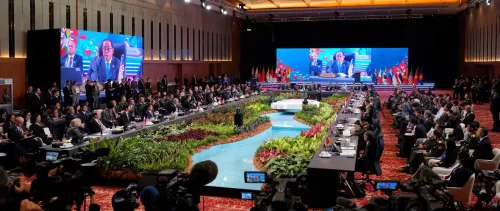
Image: World Economic Forum
This article is part of:Centre for Regions, Trade and Geopolitics
- The TradeTech Forum aims to ensure technology fulfils its potential in transforming trade so it becomes more efficient, sustainable and inclusive.
- The event enabled promising start-ups to connect with government and business leaders to unlock innovation.
- Wamkele Mene, Secretary-General of the African Continental Free Trade Area, and Johanna Hill, Deputy Director-General of the World Trade Organization, were among the speakers.
Against a backdrop of heightened global trade tensions and tit-for-tat tariffs, the stage at the TradeTech Forum 2025 in Abu Dhabi was set for lively discussions.
“We have entered a new era for international commerce,” Sean Doherty, Head of International Trade and Investment and Member of the Executive Committee at the World Economic Forum, noted in article published during the event. “Technological innovation will play a major role in this as entrepreneurs search for an edge amid rapid change.”
Policymakers, business leaders and innovators gathered at TradeTech Forum 2025 to discuss the role of technology in enabling and shaping global trade, with a focus on scaling frontier technologies. The annual event—which is organised by the TradeTech Global Initiative, a partnership between the World Economic Forum, the United Arab Emirate's Ministry of Economy and the Abu Dhabi Department of Economic Development—aims to ensure these technologies fulfil their potential in shaping a trade future, helping cross-border commerce create prosperous, sustainable and inclusive opportunities.
Speakers included Juma Mohammed Al Kait, Assistant Undersecretary of International Trade Affairs at the UAE's Ministry of Economy, and Rashed Al Blooshi, Undersecretary of the Abu Dhabi Department of Economic Development. Both leaders shared their vision for the UAE as a TradeTech hub during opening and closing remarks.
Participants also discussed how to address geopolitical challenges, navigate disruptions and manage the impact of protectionist policies. Panellists included various industry leaders such as Tarek Sultan, CEO and Vice-Chairman of the Board of Agility; Jens O. Floe, Chairman and Group CEO of Red Sea Gateway Terminal; Mahmood Al Bastaki, Chief Operating Officer of Digital Trade Solutions at DP World; and Yuri Nakada, Chief Sustainability Officer of Panasonic Connect, among others.
On investment and growth of pioneering TradeTech solutions, Tushar Singhvi, Deputy-CEO of Crescent Enterprises, and Walid Mansour, Co-Founder and Co-CEO of Middle East Venture Partners, advanced discussions on how to move from concept to scale.
“Tech isn’t the problem. Investment is,” Pete Chareonwongsak, Chief Executive Officer of Teleport, stated at the event. “For the private sector, time is money. For the public sector, compliance is king. There needs to be an overlap where investment leads to greater ease of use, transparency and trust.”
Moreover, participants like Mahmoud Mohieldin, UN Special Envoy and former Minister of Investment of Egypt, offered reflections on how innovation can support more resilient, inclusive and sustainable trade. Participants stressed the importance of harmonizing standards to have interoperable automated connected systems, improving consistency and reliability of operations. They also advocated for the adoption of advanced risk management solutions in trade and logistics, recommending that low-risk cargo moves quickly, while those with higher risk be subject to more careful scrutiny.
For more, see event highlights here and read the following three key takeaways.
1. Greater understanding of AI’s growing role
We are at the tip of the iceberg when it comes to the transformative impact artificial intelligence (AI) can have on trade, influencing everything from supply chains and logistics to trade finance, customs and compliance. Sizeable trade diversion and supply chain reorganization due to recent tariff announcements require accurately predicting outcomes and plotting strategies.
AI systems have emerged over the last few years to deal with exactly such situations of vast unstructured data sources, non-linear causality and fuzzy outcomes. They will be working in overdrive to help trading businesses keep a grasp of the unfolding context.
Building on insights from its latest TradeTech report, the Forum focused on AI's role in revolutionizing supply chains and trade governance. It is becoming increasingly clear AI holds vast potential to unlock greater efficiency, sustainability and inclusivity.
This includes opening new markets, particularly for small- and medium-sized enterprises; enabling efficient automation; enhancing supply-chain visibility; promoting sustainability; and strengthening the resilience and security of global trade.

2. Accelerating and de-risking innovation
A major focus of the TradeTech Global Initiative is identifying promising innovations and creating an environment that allows them to flourish.
The new TradeTech Accelerator programme aims to support and develop early-stage businesses with potential solutions to critical challenges in the trade sector. By connecting these emerging tech companies with governments, multinational firms and investors, the Forum hopes to fast-track the deployment of scalable, interoperable trade solutions.
Meanwhile, the TradeTech Regulatory Sandbox, developed in partnership with UAE financial authorities, is designed to allow fintechs and banks to test next-generation trade finance innovations in a controlled environment.
Eight selected startups, supporting pilots in areas such as digital trade documentation, AI-driven trade finance and blockchain-based product traceability, have all been working within regulatory sandbox environments across the UAE. Preliminary findings from these trials were announced, with a detailed paper to follow mid-year.

3. New momentum on enabling cross-border data exchange
By hosting sessions and enabling collaboration on data exchange frameworks, the TradeTech Forum 2025 injected momentum into the growing need for cross-border data solutions. Throughout the day, high-impact discussions focused on digital trade documentation, legal recognition of electronic records, and the development of interconnected blockchain-based infrastructure.
Among the promising technologies explored was Trade Worldwide Information Network (TWIN), which allows users to share and manage real-time trade data directly from the source.
During the event, keynote addresses from Wamkele Mene, Secretary-General of the African Continental Free Trade Area, and Johanna Hill, Deputy Director-General of the World Trade Organization, emphasized the need for international cooperation to scale digital trade solutions.
“TradeTech is one of the most promising drivers of a fairer and more resilient global trading system. But to scale its impact, we must work together to ensure trust, interoperability and access – especially for regions and businesses that have historically been left behind,” said Hill.
If interested in the next edition of the TradeTech Forum in 2026, pre-register to be considered to attend here.
Have you read?
- TradeTech is revolutionizing global trade
- How leveraging AI and collaboration can strengthen supply chains for humanitarian aid
- Why trade tensions are a ‘storm cloud’ over financial markets


